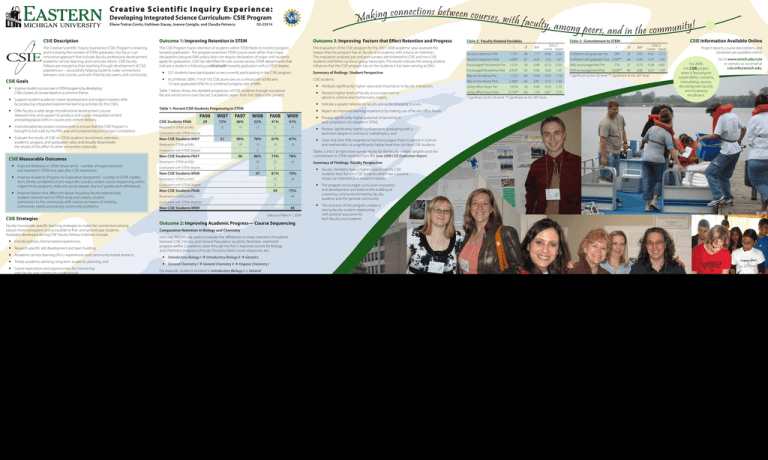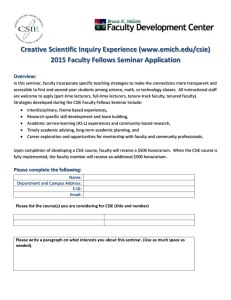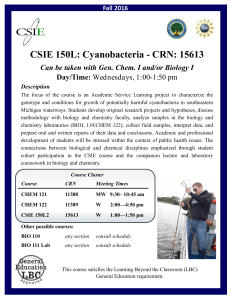M ty! in
advertisement

Creative Scientific Inquiry Experience: i o t n c e s n b n e t o w c e e g n n c i o u k r a s es, wit M Developing Integrated Science Curriculum- CSIE Program Ellene Tratras Contis, Kathleen Stacey, Joanne Caniglia, and Claudia Petrescu CSIE 05-25514 CSIE Description Outcome 1: Improving Retention in STEM Outcome 3: Improving Factors that Effect Retention and Progress The Creative Scientific Inquiry Experience (CSIE) Program is retaining and increasing the number of STEM graduates. Our focus is an innovative approach that includes faculty professional development, academic service-learning, and curricular reform. CSIE Faculty Fellows are energizing their teaching through development of CSIE experiences— successfully helping students make connections between core courses, and with their faculty, peers, and community. The CSIE Program tracks retention of students within STEM fields to monitor progress towards graduation. The program examines STEM course-work rather than major declarations because EMU policy does not require declaration of major until students apply for graduation. CSIE has identified 36 core courses across STEM departments that indicate a student is following a critical path towards graduation with a STEM degree. The evaluation of the CSIE program for the 2007-2008 academic year assessed the impact that the program has on faculty and students, with a focus on retention. The evaluation analyzed pre and post surveys administered to CSIE and non-CSIE students and follow-up focus group transcripts. The results indicate the strong positive influence that the CSIE program has on the students it has been serving at EMU. CSIE Goals Improve student success rate in STEM programs by developing CSIEs: clusters of courses based on a common theme. Support student academic-career development and subject-mastery skills by producing integrated experiential learning activities for the CSIEs. Offer faculty a wide range of professional development, course released-time, and support to produce and sustain integrated content and pedagogical shifts in course and content delivery. Table 1: Percent CSIE Students Progressing in STEM FA06 WI07 FA07 WI08 FA08 WI09 29 72% 66% 52% 41% 41% 21 19 15 11 11 Graduated with STEM degree - - - 1 - Evaluate the results of CSIE on STEM students’ recruitment, retention, academic progress, and graduation rates, and broadly disseminate the results of this effort to other universities nationally. New CSIE Students WI07 21 90% 76% 67% 67% 19 13 10 10 Graduated with STEM degree - 3 1 - New CSIE Students FA07 36 86% 75% 78% Retained in STEM at EMU 29 23 24 Graduated with STEM degree 2 2 - New CSIE Students WI08 47 81% 70% Retained in STEM at EMU 35 30 Graduated with STEM Degree 3 - New CSIE Students FA08 59 75% Improve Academic Progress to Graduation (long term)- number of STEM credits/ term, timely completion of pre-requisites courses, correct course sequencing within major/minor programs, reduced course repeats due to E grades and withdrawals. Improve factors that effect the above including faculty relationships, student commitment to STEM study and careers, student connection to the community with science as means of meeting community needs and solving community problems. CSIE Strategies Faculty incorporate specific teaching strategies to make the connections among classes more transparent and accessible to first- and second-year students. Strategies developed during CSIE Faculty Fellows Institutes include: Interdisciplinary, theme-based experiences, Research-specific skill development and team building, Academic service-learning (AS-L) experiences and community-based research, Timely academic advising, long-term academic planning, and Career exploration and opportunities for mentorship with faculty and community professionals. CSIE Clusters and Stand-Alone Seminars CSIE clusters include two STEM courses, anchored by a one-credit seminar. Faculty identify interdisciplinary connections and incorporate academic service-learning experiences and research activities that will serve both course content and the needs of a local non-profit community partner. Convenient block scheduling is an attractive benefit of the CSIE clusters for both students and faculty. Scheduling the lectures, labs, and seminar back-to-back during midday allows extended discussions through the breaks and across class periods. Students also enjoy the chance for less structured social time with both faculty and peers and occasional "pizza days" worked into the schedule. The cluster’s composition– whether all of the CSIE seminar students are enrolled in both core classes, depends upon program requirements and how closely students have followed prescribed sequencing of courses. Stand-alone seminars fulfill a need in the academic progress of students by allowing more flexibility and academic challenge. These seminars focus on timely, relevant, and complex issues that require interdisciplinary solutions. The popular Scoop on Poop seminar explores the effects of high-intensity factory farming on groundwater. Students work with the Washtenaw Land Conservancy and local farmers to test well water for E. coli and other contaminants. Students from a wide variety of academic disciplines, and grade levels work together to apply their knowledge to real-world problems. Science Olympiad Coaches’ Clinic partners EMU students with 6th-12th grade teams to compete in multi-disciplinary events. The CSIE Program also supports EMU faculty and students who volunteer as event sponsors to judge for the Washtenaw Regional competition. 1.107 40 1.17 Faculty Interaction Post 2.609* 67 4.35 1.02 7.67 Encouraged Persistence Pre 1.516 39 0.40 -0.13 Encouraged Persistence Post 2.942* 65 0.92 Rely on for advice Pre 1.125 60 Rely on for advice Post 2.366* Attribute significantly higher value and importance to faculty interaction, Using office hours Pre 1.018 Perceive higher levels of faculty encouragement to persist in science and mathematics majors, 95% CI Lower Upper -0.67 0.73 t df ∆M .099 55 0.03 Confident will graduate Post 3.099** 64 0.98 0.35 1.60 0.93 EMU encouragement Pre 57 0.23 -0.36 0.82 0.30 1.55 1.50 0.43 -0.33 1.18 EMU encouragement Post 2.658** 66 0.86 0.21 * significant at the .05 level ** significant at the .001 level 66 0.81 0.13 1.49 58 0.40 -0.39 1.19 Using office hours Post 3.770** 60 1.43 0.67 * significant at the .05 level ** significant at the .001 level 2.19 Confident will graduate Pre .776 Indicate a greater reliance on faculty advice for choosing courses, Retained in STEM at EMU Improve Retention in STEM (short term)- number of majors declared and retained in STEM one year after CSIE experience. Faculty Interaction Pre CSIE students: Institutionalize key project components to ensure that the CSIE Program is brought to full scale by the fifth year and sustained beyond project completion. CSIE Measurable Outcomes 95% CI Lower Upper -0.96 3.30 ∆M As of Winter 2009, 119 of 192 CSIE alums are on a critical path (62%) and 12 have graduated (6%) for a combined progress rate of 68%. Retained in STEM at EMU Table 3: Commitment to STEM df Summary of findings- Student Perspective CSIE Students FA06 Table 2: Faculty Related Variables mong peers, and in the community! t 237 students have participated or are currently participating in the CSIE program. Table 1 below shows the detailed progression of CSIE students through successive fall and winter terms over the last 3 academic years– from Fall 2006 to the present. h faculty, a Retained in STEM at EMU 44 Graduated with STEM degrees - New CSIE Students WI09 45 Data as of March 1, 2009 Outcome 2: Improving Academic Progress— Course Sequencing Report an improved learning experience by making use of faculty office hours, Possess significantly higher potential of persisting in and completion of a degree in STEM, Possess significantly higher confidence in graduating with a bachelors degree in science or mathematics, and State that their EMU experience had encouraged them to persist in science and mathematics at a significantly higher level than do Non-CSIE students. Tables 2 and 3 at right show survey results for the faculty related variables and the commitment to STEM variables from the June 2008 CSIE Evaluation Report. Summary of Findings- Faculty Perspective Faculty members have a higher expectation for CSIE students than for non-CSIE students which has a positive impact on retention and research interest. The program encourages curriculum innovation and development and leads to the building of a learning community formed by faculty, students and the general community. The structure of the program creates a strong faculty-student relationship, with positive outcomes for both faculty and students. Comparative Retention in Biology and Chemistry One-way ANOVA was used to evaluate the differences in mean retention of students between CSIE, Honors, and General Population students. Retention examined progress within 2 academic years through the first-3 required courses for Biology and Chemistry programs of study. The prescribed course sequences are: Introductory Biology I Introductory Biology II Genetics General Chemistry I General Chemistry II Organic Chemistry I For example, students enrolled in Introductory Biology I or General Chemistry I in the FA06 term would be expected to complete Genetics or Organic Chemistry I respectively by the end of WI08. CSIE students and Honors students did not differ significantly. Both CSIE students and Honors students had significantly higher retention than the General Population students. CSIE had a significantly higher mean retention than General Population students progressing from Intro Biology I to Intro Biology II. (CSIE mean retention 0.56 compared with 0.34 in General Population. n= 525, ∆M = .220, 95% CI = .05 to .39) CSIE had a significantly higher mean retention than General Population progressing from General Chemistry I through to Organic Chemistry. (CSIE mean retention 0.32 compared with 0.11 in General Population. n=702, ∆M = .201, 95% CI = .05 to .35) Photography Credits: Randall J. Mascharka, Steve Pernecky, Steve Francoeur, Marianne LaPorte, Cara Shillington, Marty Brown, and Anne Seaman. CSIE Information Available Online Project reports, course descriptions, and schedules are available online. For 2009, the CSIE project team is focusing on sustainability concerns, normalizing courses, recruiting new faculty, and increasing enrollment. Go to www.emich.edu/csie or contact us via email at csie.info@emich.edu.


